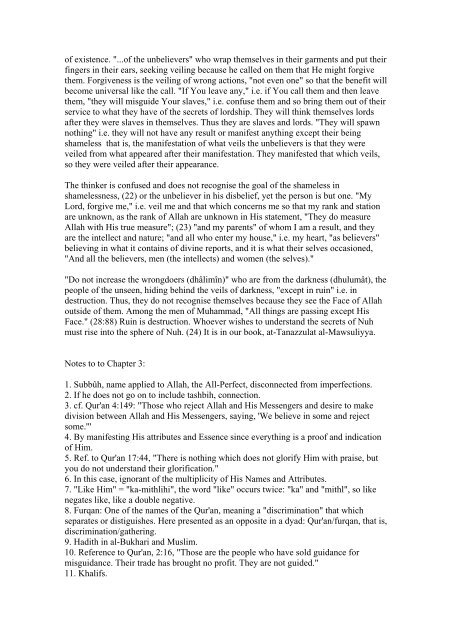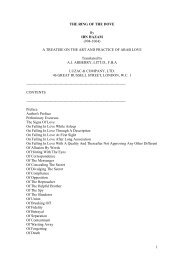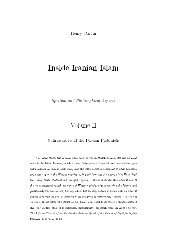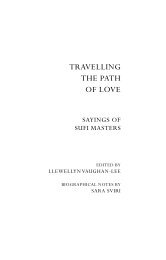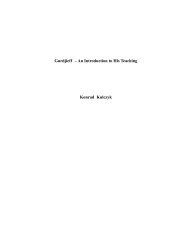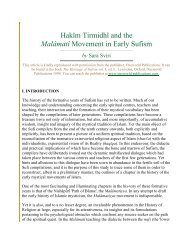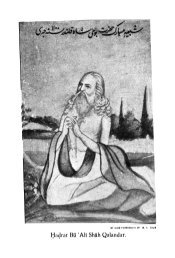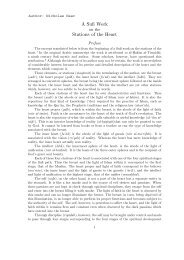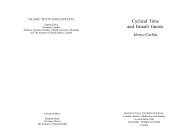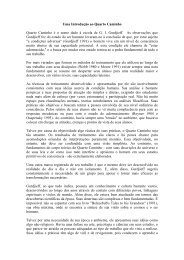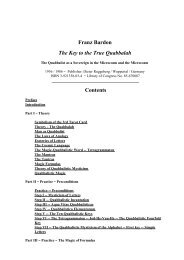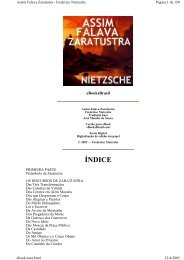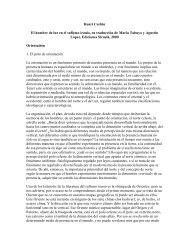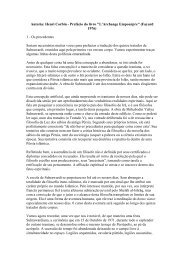Fusus al-Hikam The Seals of Wisdom by Shaykh al ... - ImagoMundi
Fusus al-Hikam The Seals of Wisdom by Shaykh al ... - ImagoMundi
Fusus al-Hikam The Seals of Wisdom by Shaykh al ... - ImagoMundi
You also want an ePaper? Increase the reach of your titles
YUMPU automatically turns print PDFs into web optimized ePapers that Google loves.
<strong>of</strong> existence. "...<strong>of</strong> the unbelievers" who wrap themselves in their garments and put their<br />
fingers in their ears, seeking veiling because he c<strong>al</strong>led on them that He might forgive<br />
them. Forgiveness is the veiling <strong>of</strong> wrong actions, "not even one" so that the benefit will<br />
become univers<strong>al</strong> like the c<strong>al</strong>l. "If You leave any," i.e. if You c<strong>al</strong>l them and then leave<br />
them, "they will misguide Your slaves," i.e. confuse them and so bring them out <strong>of</strong> their<br />
service to what they have <strong>of</strong> the secrets <strong>of</strong> lordship. <strong>The</strong>y will think themselves lords<br />
after they were slaves in themselves. Thus they are slaves and lords. "<strong>The</strong>y will spawn<br />
nothing" i.e. they will not have any result or manifest anything except their being<br />
shameless that is, the manifestation <strong>of</strong> what veils the unbelievers is that they were<br />
veiled from what appeared after their manifestation. <strong>The</strong>y manifested that which veils,<br />
so they were veiled after their appearance.<br />
<strong>The</strong> thinker is confused and does not recognise the go<strong>al</strong> <strong>of</strong> the shameless in<br />
shamelessness, (22) or the unbeliever in his disbelief, yet the person is but one. "My<br />
Lord, forgive me," i.e. veil me and that which concerns me so that my rank and station<br />
are unknown, as the rank <strong>of</strong> Allah are unknown in His statement, "<strong>The</strong>y do measure<br />
Allah with His true measure"; (23) "and my parents" <strong>of</strong> whom I am a result, and they<br />
are the intellect and nature; "and <strong>al</strong>l who enter my house," i.e. my heart, "as believers"<br />
believing in what it contains <strong>of</strong> divine reports, and it is what their selves occasioned,<br />
"And <strong>al</strong>l the believers, men (the intellects) and women (the selves)."<br />
"Do not increase the wrongdoers (dhâlimîn)" who are from the darkness (dhulumât), the<br />
people <strong>of</strong> the unseen, hiding behind the veils <strong>of</strong> darkness, "except in ruin" i.e. in<br />
destruction. Thus, they do not recognise themselves because they see the Face <strong>of</strong> Allah<br />
outside <strong>of</strong> them. Among the men <strong>of</strong> Muhammad, "All things are passing except His<br />
Face." (28:88) Ruin is destruction. Whoever wishes to understand the secrets <strong>of</strong> Nuh<br />
must rise into the sphere <strong>of</strong> Nuh. (24) It is in our book, at-Tanazzulat <strong>al</strong>-Mawsuliyya.<br />
Notes to to Chapter 3:<br />
1. Subbûh, name applied to Allah, the All-Perfect, disconnected from imperfections.<br />
2. If he does not go on to include tashbih, connection.<br />
3. cf. Qur'an 4:149: "Those who reject Allah and His Messengers and desire to make<br />
division between Allah and His Messengers, saying, 'We believe in some and reject<br />
some.'"<br />
4. By manifesting His attributes and Essence since everything is a pro<strong>of</strong> and indication<br />
<strong>of</strong> Him.<br />
5. Ref. to Qur'an 17:44, "<strong>The</strong>re is nothing which does not glorify Him with praise, but<br />
you do not understand their glorification."<br />
6. In this case, ignorant <strong>of</strong> the multiplicity <strong>of</strong> His Names and Attributes.<br />
7. "Like Him" = "ka-mithlihi", the word "like" occurs twice: "ka" and "mithl", so like<br />
negates like, like a double negative.<br />
8. Furqan: One <strong>of</strong> the names <strong>of</strong> the Qur'an, meaning a "discrimination" that which<br />
separates or distiguishes. Here presented as an opposite in a dyad: Qur'an/furqan, that is,<br />
discrimination/gathering.<br />
9. Hadith in <strong>al</strong>-Bukhari and Muslim.<br />
10. Reference to Qur'an, 2:16, "Those are the people who have sold guidance for<br />
misguidance. <strong>The</strong>ir trade has brought no pr<strong>of</strong>it. <strong>The</strong>y are not guided."<br />
11. Kh<strong>al</strong>ifs.


